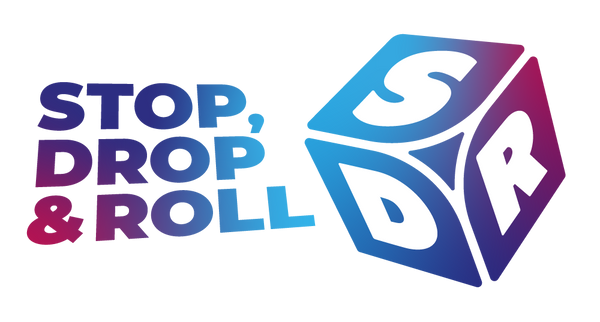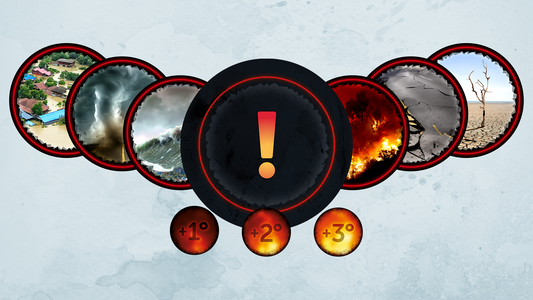//This Dev Blog was originally posted as an update on the Earth Rising Kickstarter on August 27, 2021//
Welcome to episode two of the Earth Rising development blog! Are you ready to be bored? No wait, I meant ‘board’!
I promise that will be my lamest joke for the rest of the blog.
Seriously though, today I’m going to talk about the board! There’s quite a lot to it, and as such I’m going to split it into sections. We’ll be covering the sectors, ecological ceiling, the poverty hole, and how it ties it all together!
The Six Sectors of Society
Fun fact: during development we had to purposefully cut down on S words. “Sustainable Social Practices taking Strain from one of the Six Sectors of Society” is a hell of a sentence!
The Earth Rising board is made up of six different sectors, each one making up a key area of human activity that any society relies upon. Without any one of these sectors, modern life as we know it would cease to be and the most baseline quality of life for everyone would decline. Imagine a life without power, water, necessities such as clothes or vehicles, or even accessible food… would it still be possible to live life as you do now?
Yet it’s even harder for people to imagine their society without a clear sense of culture (our society's core values and concepts they fundamentally agree on) or political structure (the way in which we are able to influence our society’s laws and functions). With no defined culture there would be no expectations for how people will act or react, or which ways of living are considered acceptable. This includes, for example, the expectation or value of education.
A political structure without the means for people to affect it (such as a dictatorship) or high in corruption would make you effectively powerless to the whims of the state, or in the case of a lack of codified rights, the whims of employers or landlords.
A lack of strong culture or political access may not cause starvation, but ultimately results in inequality of opportunity, and creates higher poverty. For more on this, check out the very well sourced Transition Report: Equal Opportunities in an Unequal World.

So hopefully this shows why all of these sectors are important! But did you know that each sector is also carefully placed? While not an exact science (all sectors depend on one another to some degree) each sector in the game is placed between the two sectors that are critical to their success.
Industry relies upon a strong, dependable energy source alongside the non-consumable produce of the Agriculture sector (cotton and rubber, for example). Meanwhile a strong culture can only flourish with reliable infrastructure (be it through high quality homes and amenities, or the ability to access reliable work) and political access.
Take a look at which sectors are beside each other, and consider what they need to function!
The Ecological Ceiling
The sectors need to function, that is absolutely clear. Throughout the last two hundred years we’ve developed our society and quality of life in leaps and bounds, and our incredible progress is something to be celebrated!
Yet it doesn’t come without a cost. The blue band around the edge of our society is the Ecological Ceiling, the boundary showing what our planet is able to comfortably withstand without damaging our ecology, and by extension, the ability for us to survive long-term.
All Practices, Sustainable or Unsustainable, have an effect on our planet. Yet it’s our duty as inhabitants of this wonderful world we share to ensure that we put as little strain on it as we can.

Each sector takes different things from our planet in order to function, and in Earth Rising, it’s our job to transform our society so that these sectors reduce the strain they’re placing on our ecosystems.
The planet and its ecosystems are resilient (as 40,000 years of human development has shown) but we’ve reached a point where our output is greater than its tolerance. Any strain that is placed over the Ecological Ceiling is strain beyond what the planet can handle.
The Poverty Hole
What’s that black mass in the centre of the board? It’s the poverty hole! Wooo!
Far from an actual party, the poverty hole is where people end up when their society fails to provide what’s necessary for them to live a balanced life. What constitutes a balanced life, you ask? Check out the UN’s Sustainable Development Goals to get a good idea of what’s expected of modern societies to provide for their people, along with the risks that surround not reaching them. Many societies succeed on several of these goals, but fall short on others. Failing on any of these fronts provides the opportunity for people to fall through the cracks and slip into poverty.

Once in poverty, it’s very difficult to get out. In its most extreme form, homelessness can cause huge barriers to re-entry into safety, as without an address you cannot have a bank account, yet without a bank account you cannot get a job, which in turn is required to afford to rent and therefore get an address. Other forms of poverty prevent people from accessing education, healthcare, or nutritional needs. Being able to earn enough to pay your rent but without the ability to afford more than instant noodles to live on is still a form of poverty, and one that’s often overlooked.
Why do people in poverty put strain on our planet? It’s a topic worth a whole post of its own, and we’ll be posting that soon!
Finding the Balance
Social Practices in each sector provide what’s needed for people to live a healthy, happy, balanced life, and the more our society provides the easier it becomes for people to attain that standard. Yet providing for these needs in a way that our planet cannot handle will ultimately damage our biosphere, and in turn make it harder (due to natural disasters, pandemics, famines and a whole host of other consequences) for us to maintain our way of life.
Balancing the needs of the people and the needs of the planet isn’t an easy task, but it is possible! It takes careful consideration, and acknowledgement of the consequences of our actions, but we can do it together, all while making life better for everyone.

Enjoying Earth Rising's Dev Blog? Leave a comment below, or read on in Dev Blog 3 - The Anatomy of a Social Influence Card!




